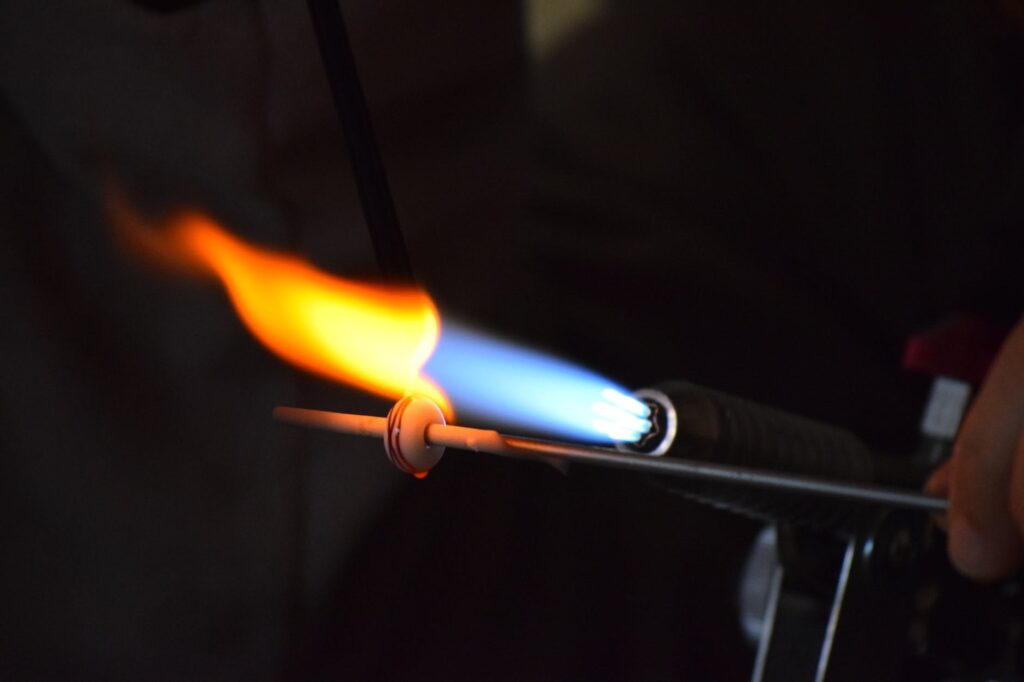
Photo by Pixabay on <a href="https://www.pexels.com/photo/abstract-blaze-blur-bright-266154/" rel="nofollow">Pexels.com</a>
Know the experts to consult during a gas leak emergency and prevent avoidable gas accidents. A miserable day or week, sometimes, is just a ‘bad smell’ away. Have you ever experienced at some point in time a nasty rotten egg smell which just seems to cling to everything, with no conceivable source? This is usually the most obvious indicator of a gas leak. In such situations, the right way to react tends to magically evade us (the ideas must’ve been hiding from the choking smell too). Of course, an average person might know that he should immediately ventilate and exit the apartment. But, what do you do after? Who exactly are the ‘proper authorities’ to contact for help?
Like a dream, like a vision, like a little flower grows, all things occur in stages. To answer these questions, we need to start from the beginning.
What exactly is a Gas Line?
A gas line is a piece of pipe or hose, most commonly made of steel, copper, or brass or their alloys, which connects a gas appliance to the main supply of natural gas for an apartment, office, or industrial building.
How do Gas Lines go Bad?
Utility gas lines are usually made of the above-listed materials. But, some utilities specifically prohibit the usage of copper. While in others, copper is used excessively.
There are times when damage can occur to gas lines without you knowing. This could, most often than not, occur without any direct fault of yours.
Examples of such problems which could damage gas pipes include:
- Improper connections
- Inappropriate materials
- Rusting
- Inadequate support
Why Should I Care if the Gas Lines Get Damaged?
You should careif a gas pipe gets damaged. Do you know that the natural gas lines on your property are your responsibility? In a situation of a gas line leak or damage, you may have to bear the repair costs.
Besides, if left unchecked, it’s a danger to your health and properties.
How Do I Know When there’s a Gas Leak?
You know there’s a gas leak when you observe the following:
- Unhealthy or dying plants
- A rotten egg smell
- A flame burning more yellow than blue
- Light headedness and feeling unwell
Gas leaks often occur unexpectedly, but there are certain indicators to watch for in order to avoid being caught unawares.
Indicators of gas leaks include:
- Unhealthy or dying plants: Natural gases could combine with oxygen in the air and therefore, prevent your plants from getting the air they need.
- Rotten egg smell: Most natural gases are colorless and odorless, but companies manufacturing them add in sulfur (which smells like rotten eggs) to make a leak detectable. When you notice this, know there’s possibly a gas leak.
- Light Headedness and feeling unwell: Small amounts of natural gases are not very harmful to you. But if given the chance to build up, they could result in hypoxia, also known as oxygen deficiency, and carbon monoxide poisoning, which could make you very sick and if left untreated, could be fatal.
Why is a Gas Leak Dangerous?
- Natural gases are generally very volatile. Therefore, when gas from a leak builds up to a certain amount, any little spark ––as simple as you turning a key in a lock–– could result in an explosion.
- Natural gases are also very harmful to your health if inhaled in large quantities.
What Do I Do When I Notice a Gas Leak?
- Evacuate the apartment immediately along with everyone present.
- Do not make emergency calls or flip any electrical switches as this might lead to an explosion.
- Ventilate the building by leaving all the doors and windows opened
How Long Does itTake For a Gas Leak Smell to Fade?
It usually takes a few hours for the smell to fade. If it does not, contact immediately any of the following experts or agencies:
- Your gas company
- A licensed plumber
- A medical center
- Emergency contact of your residence
What You Should NOT Do During a Gas Leak:
- Try fixing it yourself
- Making a phone call inside the house or apartment
- Remaining inside the apartment
- Trying to save money by employing an unskilled cheap labor
- Do not attempt fixing it yourself; if the smell persists after a few hours, it might be an indication of a more extensive leak.
- If you feel ill in any way, consult your physician immediately. You might be experiencing carbon monoxide poisoning.
In conclusion, a gas leak in itself is not a death sentence and doesn’t have to result in a fatal accident. It’s your reaction to such situations that determines the end result. Like the famous saying, prevention is always better than cure. You can avoid having to deal with a gas leak situation by taking up the responsibility of maintaining the gas pipes in your immediate surroundings. The cost you would use for regular maintenance is way less than what you would have to pay to fix a gas leak. It’s also a whole lot safer.
Save a life today by enlightening somebody on the safety precaution measures for a gas leak. Remember, you only have to start a spark, and the chain reaction for a better world will never stop!









